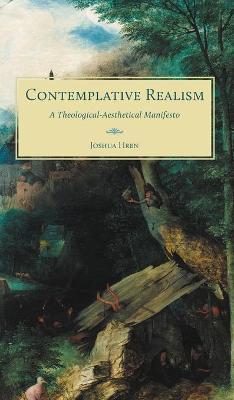Contemplative Realism: A Theological-Aesthetical Manifesto

Contemplative Realism: A Theological-Aesthetical Manifesto
As ever, but especially in our present age of raging post-truth unreality, we ought to heed Pope Benedict XVI's summons to "ask rather more carefully what 'the real' actually is." So-called "realism" can blind us-instead of binding us-to things as they are. "Are we not interested in the cosmos anymore?" Benedict asks. "Are we today really hopelessly huddled in our own little circle?" If this preeminent mind of our time is not wrong, and "the man who puts to one side the reality of God is a realist only in appearance," then we ought to ask with unflinching intensity and openness: what is real? Like liturgy, literature asks this question with a range of forms that answer it very differently. At times, both art and worship seem to devolve into the manners and mood of self-referential and inconsequential play, gestures without meaning, or "bank notes" (says Benedict) "without funds to cover them." These too-closed circles of communication wall off transcendence. In living cruciform liturgy-on the contrary-"the congregation does not offer its own thoughts or poetry but is taken out of itself and given the privilege of sharing in the cosmic song of praise of the cherubim and seraphim." In living contemplative literature something analogous happens: we suffer and praise with the whole of creation; the prose cultivates a grateful disposition, prompting us to yearn for a vision of the whole.
But this manifesto on behalf of a "contemplative realism" makes no claims to create, ex nihilo, a new aesthetical species. Rather, it seeks to articulate a literary approach that exists already in diffuse books as well as in the potencies of living artists. It seeks to gather and galvanize those souls. More than anything, it yearns to quicken a contemplative realist disposition among as many comers as possible-literary chops or no. For, in a very bad way (to borrow from Josef Pieper), "man's ability to see is in decline."
Joshua Hren is founder of Wiseblood Books and co-founder of the Master of Fine Arts in Creative Writing at the University of St. Thomas, Houston. His books include: the short story collections This Our Exile and In the Wine Press; the book of poems Last Things, First Things, & Other Lost Causes; Middle-earth and the Return of the Common Good: J.R.R. Tolkien and Political Philosophy; How to Read (and Write) Like a Catholic; and the novel Infinite Regress.
PRP: 107.47 Lei
Acesta este Prețul Recomandat de Producător. Prețul de vânzare al produsului este afișat mai jos.
96.72Lei
96.72Lei
107.47 LeiLivrare in 2-4 saptamani
Descrierea produsului
As ever, but especially in our present age of raging post-truth unreality, we ought to heed Pope Benedict XVI's summons to "ask rather more carefully what 'the real' actually is." So-called "realism" can blind us-instead of binding us-to things as they are. "Are we not interested in the cosmos anymore?" Benedict asks. "Are we today really hopelessly huddled in our own little circle?" If this preeminent mind of our time is not wrong, and "the man who puts to one side the reality of God is a realist only in appearance," then we ought to ask with unflinching intensity and openness: what is real? Like liturgy, literature asks this question with a range of forms that answer it very differently. At times, both art and worship seem to devolve into the manners and mood of self-referential and inconsequential play, gestures without meaning, or "bank notes" (says Benedict) "without funds to cover them." These too-closed circles of communication wall off transcendence. In living cruciform liturgy-on the contrary-"the congregation does not offer its own thoughts or poetry but is taken out of itself and given the privilege of sharing in the cosmic song of praise of the cherubim and seraphim." In living contemplative literature something analogous happens: we suffer and praise with the whole of creation; the prose cultivates a grateful disposition, prompting us to yearn for a vision of the whole.
But this manifesto on behalf of a "contemplative realism" makes no claims to create, ex nihilo, a new aesthetical species. Rather, it seeks to articulate a literary approach that exists already in diffuse books as well as in the potencies of living artists. It seeks to gather and galvanize those souls. More than anything, it yearns to quicken a contemplative realist disposition among as many comers as possible-literary chops or no. For, in a very bad way (to borrow from Josef Pieper), "man's ability to see is in decline."
Joshua Hren is founder of Wiseblood Books and co-founder of the Master of Fine Arts in Creative Writing at the University of St. Thomas, Houston. His books include: the short story collections This Our Exile and In the Wine Press; the book of poems Last Things, First Things, & Other Lost Causes; Middle-earth and the Return of the Common Good: J.R.R. Tolkien and Political Philosophy; How to Read (and Write) Like a Catholic; and the novel Infinite Regress.
Detaliile produsului










